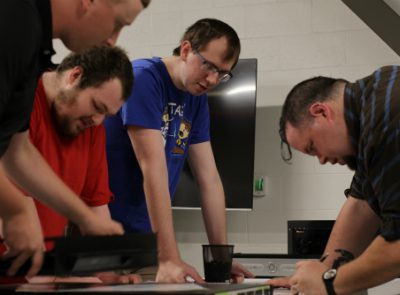One of the biggest issues the CE industry faces is injecting new talent into its workforce. To help combat this problem, CEDIA designed a 12-week pilot program called Electronic Systems Integration Technician Training to equip future home technology professionals with in-demand fundamentals.
The pilot group of students recently graduated from the program, which takes a hands-on and comprehensive approach to preparing the next generation of A/V talent.
CEDIA says its focus on workforce development and the completion of the program’s successful pilot phase is a key milestone for the organization.
“The program is a central component of CEDIA’s workforce development strategy,” says CEDIA director of workforce development Tommy Tabor.
“This program is really geared towards making sure that folks that we’re attracting to the industry have the skillset they need to be fully contributing members to the employers that hire them.”
The program involves 108 hours of job skills training—from basic laboratory work to home technology infrastructure training and rack building to home theater installation—and CEDIA’s long-term objective is to roll it out nationally.
The company has identified multiple states as potential candidates for the program’s expansion, which could include partnerships with technical schools, trade schools, and community colleges.
Retaining Quality Employees Remains Difficult
Nearly 30% of respondents to CEDIA’s 2018 “Size and Scope of the Residential Technology Systems Industry” survey reported finding and keeping qualified employees as a challenge for integration firms—by far the biggest concern identified by employers of all sizes.
“There is an entry-level shortage in our industry, all the way down to my personal level,” said Thoughtful Integrations president Joe Whitaker, who serves on the CEDIA board of directors and the organization’s Strategic Advisory Council and Workforce Development Working Group.
“We can’t move forward unless there are people that take my place 10 and 20 years down the road. CEDIA’s overall strategy holds a lot of different components, from education to industry outreach, but none of those can continually go without a workforce to support an industry.”
Read Next: CE Pro 100 Discuss Job Training and Recruitment
The pilot program’s inaugural class had eight graduates, two of whom have already secured employment in the industry.
According to CEDIA, by graduation night, seven trainees had also earned Electronic Systems Professional Alliance (ESPA) Electronic Systems Technician (EST) credentials and six earned CEDIA Electronic Systems Certified (ESC) credentials.
The initiative has received occupational skills training approval from the state of Indiana and it is in-compliance with Workforce Innovation and Opportunity Act (WIOA) policies at the state and federal levels.
“We learned a lot from running this first cohort,” says Tabor. “We look forward to rolling it out in more states and we are happy to talk to members about how they can begin setting the foundation in their market for the program to be successful.”
Connect to more on CEDIA Education initiatives and opportunities here.






